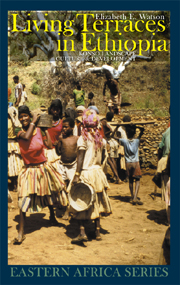Book contents
- Frontmatter
- Contents
- List of Photographs
- List of Maps, Tables & Figures
- Acknowledgements
- Foreword
- Introduction: Konso Landscape, Culture & Development
- 1 Konso Intensive Indigenous Agriculture
- 2 Social Life of Agriculture
- 3 Ritual Life of Agriculture
- 4 Political Life of Agriculture
- 5 Modernity & Christianity
- 6 Revolutionary State
- 7 Ethnic Decentralization & Self-determination
- Conclusion: Landscape, Meaning & Development
- References
- Index
7 - Ethnic Decentralization & Self-determination
Published online by Cambridge University Press: 12 September 2012
- Frontmatter
- Contents
- List of Photographs
- List of Maps, Tables & Figures
- Acknowledgements
- Foreword
- Introduction: Konso Landscape, Culture & Development
- 1 Konso Intensive Indigenous Agriculture
- 2 Social Life of Agriculture
- 3 Ritual Life of Agriculture
- 4 Political Life of Agriculture
- 5 Modernity & Christianity
- 6 Revolutionary State
- 7 Ethnic Decentralization & Self-determination
- Conclusion: Landscape, Meaning & Development
- References
- Index
Summary
The previous two chapters explored the way in which the values and practices of the Derg government and Protestant Christians intersected. The relationship between these two bodies was not straightforward as they did not share the same values, but they shared some of the same goals. They shared a desire to eradicate aspects of culture they found harmful, and they were both modernizing in their own ways. The outcome of this convergence of aims was a ‘discourse coalition’ (Hajer, 1995). The Protestant Christians became some of the main supporters of reforms brought in by the Derg. As a result Konso society became bifurcated. Two groups of people, discourses, and ‘ways of doing things’ emerged, which are described here as corresponding to Bourdieu's orthodoxy and heterodoxy. The orthodoxy was made up of customary practices based in the belief that ‘they are the way things have always been’. They had the legitimacy of ‘tradition’, the power of the belief in ‘das “ewig Gestrigen”’, ‘the eternal yesterday’ (Weber, 1978). The heterodoxy was made up of a combination of appropriated Derg policies and Protestant Christian teachings. Whereas the orthodoxy involved a commitment to the indigenous institutions of the poqalla, to customary tenure and to indigenous networks of labour access, the heterodoxy involved a commitment to state-defined land tenure, and rejected indigenous practices as ‘devil worship’. The heterodoxy saw itself as ‘modern’, the customary as ‘traditional’.
- Type
- Chapter
- Information
- Living Terraces in EthiopiaKonso Landscape, Culture and Development, pp. 193 - 216Publisher: Boydell & BrewerPrint publication year: 2009



